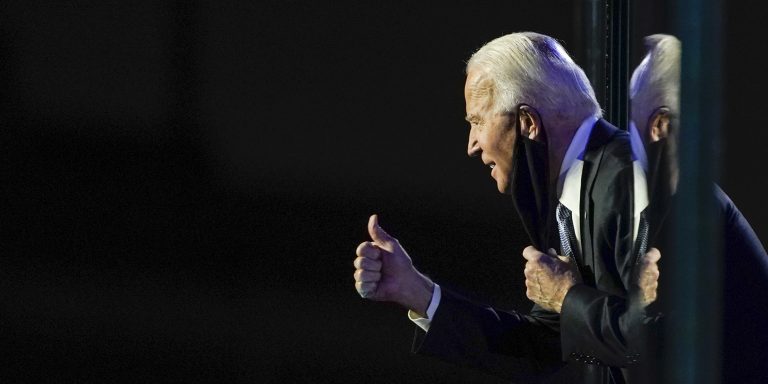INTELBRIEF
November 9, 2020
IntelBrief: Biden Administration Shifts in U.S. Middle East Policy

Bottom Line up Front
- U.S. Middle East policy will shift modestly, with the exception of a more significant change in Iran policy, under the incoming Biden administration.
- There is little public support for significant U.S. interventions in the region or to reverse the Trump administration’s drawdowns in Iraq and Afghanistan.
- Trump administration sanctions and Iran’s violations of the nuclear deal will complicate Biden administration efforts to rejoin that accord.
- The Biden administration will be less supportive than was the Trump administration of Netanyahu, Mohammad bin Salman, and Mohammad bin Zayid Al Nahyan.
The incoming Biden administration will likely change U.S. Middle East policy marginally, not dramatically. The limitations of the Biden administration’s ability to alter policy are a function of the U.S. public’s increasing reticence to support U.S. military interventions or the expenditure of significant U.S. diplomatic and economic resources in the region. Middle East policy was not a major factor in the 2020 presidential election and the incoming Biden administration is not perceived as receiving a public mandate for any particular policy alternatives in the region. As a prominent example, there was little debate during the presidential campaign over the Trump administration’s drawdown of U.S. forces from Iraq and Afghanistan, suggesting that the Biden administration will not alter the decisions to wind down U.S. involvement in those countries. At the same time, there is strong U.S. consensus for continued counterterrorism operations against the Islamic State organization and Al Qaeda, missions that require the deployment of at least some U.S. forces in the region.
Yet, a Biden administration is likely to shift some Trump policies back to those implemented by the Obama administration, particularly in the case of Iran. President-elect Biden penned an editorial on September 13 expressing his intent to return to the 2015 multilateral Iran nuclear deal that was negotiated by the Obama administration but was abrogated by President Trump in 2018. Doing so will require lifting all sanctions required to be suspended under that deal, as well as rolling back the multiplicity of additional sanctions on Iran imposed by President Trump. It is likely that Iran will demand that the Biden administration rescind the designation of the Islamic Revolutionary Guard Corps (IRGC) and Iran’s Central Bank as terrorist entities. On the other hand, Iran has responded to the Trump sanctions by violating its nuclear commitments under the deal. Iran’s transgressions might require complicated renegotiation and reversal before the United States would resume participating in the accord. And, there are no indications that the Biden administration will discontinue any U.S. efforts to deter Iran in the Persian Gulf or counter Iran’s interventions in Syria, Lebanon, Yemen, or Iraq – whether or not the United States rejoins the accord without new conditions.
Another likely significant Biden shift will be in relations with the Trump administration's anti-Iran ‘axis’ consisting of Israel, Saudi Arabia, and the United Arab Emirates (UAE). The Biden administration is likely to have cool relations with Israeli Prime Minister Benjamin Netanyahu, as did the Obama administration, over Netanyahu’s policy of expanding settlements in and possibly annexing parts of the West Bank and his efforts to lobby the U.S. Congress to oppose the Iran nuclear deal. The Biden administration is likely to return to the traditional U.S. stance of attempting to broker an Israel-Palestinian peace, rather than adopt the Trump administration’s policy centered on arranging peace deals between Israel and the Arab states without first securing an Israeli-Palestinian peace.
The Israel - Arab Gulf state axis was an outgrowth of the Trump administration’s affinity for Saudi Crown Prince Mohammad bin Salman and UAE de-facto leader Mohammad bin Zayid Al Nahyan as pillars of U.S. Iran policy and Trump administration efforts to devolve security responsibility to regional players. However, the Trump policy also entailed downplaying U.S. concerns about the human rights records of the two regimes and their controversial interventions in Yemen, Libya, and elsewhere. The Biden administration is likely instead to more closely scrutinize potential U.S. sales to the Gulf states, potentially including cancelling the Trump administration’s proposed sale of the advanced F-35 stealth fighter to the UAE. The sale was announced several weeks after the September UAE normalization of relations with Israel. Nor is the Biden administration likely to conduct ‘business as usual’ with Saudi Crown Prince Mohammad bin Salman until there is greater accountability for his role in the October 2019 killing of journalist Jamal Kashoggi in Istanbul. Such accountability is nowhere in sight, suggesting that U.S. relations with Saudi Arabia will deteriorate significantly from the level of the past four years of President Trump.